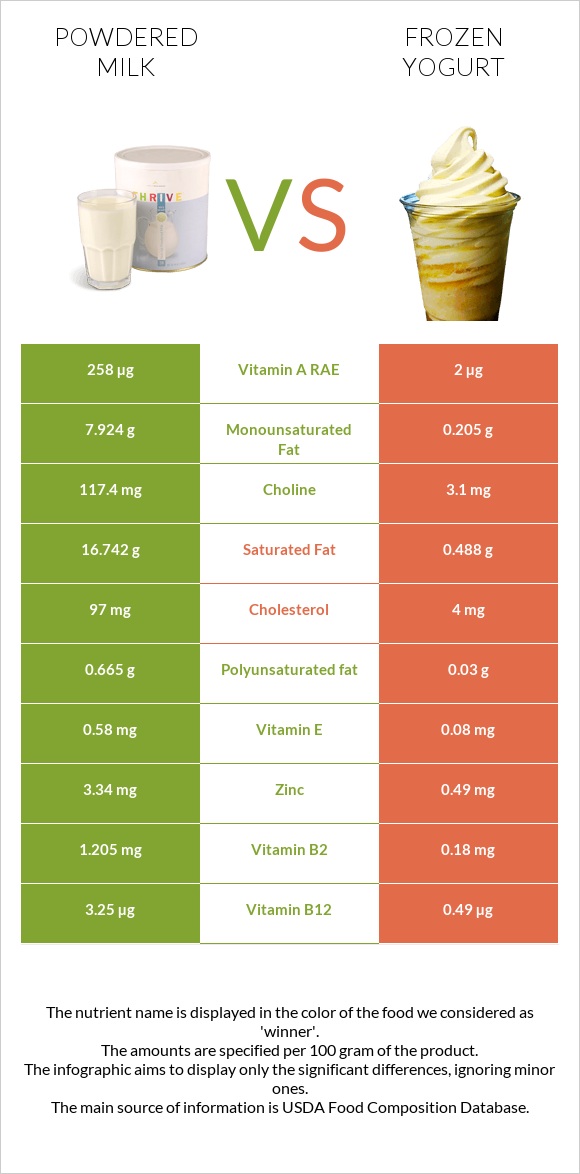Powdered milk vs. Frozen yogurt — In-Depth Nutrition Comparison
Compare
What are the differences between powdered milk and frozen yogurt?
- Powdered milk is richer than frozen yogurt in vitamin B12, phosphorus, vitamin B2, calcium, potassium, zinc, selenium, and choline.
- Powdered milk's daily need coverage for vitamin B12 is 115% more.
- Powdered milk has 38 times more choline than frozen yogurt. While powdered milk has 117.4mg of choline, frozen yogurt has only 3.1mg.
- The amount of saturated fat in frozen yogurt is lower.
- The glycemic index of powdered milk is lower.
We used Milk, dry, whole, without added vitamin D and Yogurt, frozen, flavors not chocolate, nonfat milk, with low-calorie sweetener types in this article.
Infographic

Infographic link
Mineral Comparison
Mineral comparison score is based on the number of minerals by which one or the other food is richer. The "coverage" charts below show how much of the daily needs can be covered by 300 grams of the food.
| Contains more MagnesiumMagnesium | +112.5% |
| Contains more CalciumCalcium | +473.6% |
| Contains more PotassiumPotassium | +292.3% |
| Contains more IronIron | +1075% |
| Contains more ZincZinc | +581.6% |
| Contains more PhosphorusPhosphorus | +501.6% |
| Contains more ManganeseManganese | +∞% |
| Contains more SeleniumSelenium | +482.1% |
| Contains more CopperCopper | +153.8% |
| Contains less SodiumSodium | -78.2% |
Vitamin Comparison
Vitamin comparison score is based on the number of vitamins by which one or the other food is richer. The "coverage" charts below show how much of the daily needs can be covered by 300 grams of the food.
| Contains more Vitamin CVitamin C | +1128.6% |
| Contains more Vitamin AVitamin A | +12800% |
| Contains more Vitamin EVitamin E | +625% |
| Contains more Vitamin DVitamin D | +∞% |
| Contains more Vitamin B1Vitamin B1 | +607.5% |
| Contains more Vitamin B2Vitamin B2 | +569.4% |
| Contains more Vitamin B3Vitamin B3 | +223% |
| Contains more Vitamin B5Vitamin B5 | +∞% |
| Contains more Vitamin B6Vitamin B6 | +655% |
| Contains more Vitamin B12Vitamin B12 | +563.3% |
| Contains more Vitamin KVitamin K | +633.3% |
| Contains more FolateFolate | +208.3% |
| Contains more CholineCholine | +3687.1% |
All nutrients comparison - raw data values
| Nutrient |  |
 |
DV% diff. |
| Vitamin B12 | 3.25µg | 0.49µg | 115% |
| Phosphorus | 776mg | 129mg | 92% |
| Vitamin B2 | 1.205mg | 0.18mg | 79% |
| Calcium | 912mg | 159mg | 75% |
| Saturated fat | 16.742g | 0.488g | 74% |
| Vitamin B5 | 2.271mg | 45% | |
| Protein | 26.32g | 4.4g | 44% |
| Fats | 26.71g | 0.8g | 40% |
| Cholesterol | 97mg | 4mg | 31% |
| Potassium | 1330mg | 339mg | 29% |
| Vitamin A | 258µg | 2µg | 28% |
| Zinc | 3.34mg | 0.49mg | 26% |
| Selenium | 16.3µg | 2.8µg | 25% |
| Choline | 117.4mg | 3.1mg | 21% |
| Vitamin B6 | 0.302mg | 0.04mg | 20% |
| Vitamin B1 | 0.283mg | 0.04mg | 20% |
| Calories | 496kcal | 104kcal | 20% |
| Monounsaturated fat | 7.924g | 0.205g | 19% |
| Copper | 0.08mg | 0.203mg | 14% |
| Sodium | 371mg | 81mg | 13% |
| Magnesium | 85mg | 40mg | 11% |
| Vitamin C | 8.6mg | 0.7mg | 9% |
| Fiber | 0g | 2g | 8% |
| Carbs | 38.42g | 19.7g | 6% |
| Folate | 37µg | 12µg | 6% |
| Iron | 0.47mg | 0.04mg | 5% |
| Polyunsaturated fat | 0.665g | 0.03g | 4% |
| Vitamin D | 0.5µg | 0µg | 3% |
| Vitamin E | 0.58mg | 0.08mg | 3% |
| Vitamin B3 | 0.646mg | 0.2mg | 3% |
| Vitamin D | 20IU | 0IU | 3% |
| Manganese | 0.04mg | 2% | |
| Vitamin K | 2.2µg | 0.3µg | 2% |
| Net carbs | 38.42g | 17.7g | N/A |
| Sugar | 38.42g | 12.61g | N/A |
| Tryptophan | 0.371mg | 0% | |
| Threonine | 1.188mg | 0% | |
| Isoleucine | 1.592mg | 0% | |
| Leucine | 2.578mg | 0% | |
| Lysine | 2.087mg | 0% | |
| Methionine | 0.66mg | 0% | |
| Phenylalanine | 1.271mg | 0% | |
| Valine | 1.762mg | 0% | |
| Histidine | 0.714mg | 0% |
Macronutrient Comparison
Macronutrient breakdown side-by-side comparison
Protein:
26.32 g
Fats:
26.71 g
Carbs:
38.42 g
Water:
2.47 g
Other:
6.08 g
Protein:
4.4 g
Fats:
0.8 g
Carbs:
19.7 g
Water:
73.5 g
Other:
1.6 g
| Contains more ProteinProtein | +498.2% |
| Contains more FatsFats | +3238.8% |
| Contains more CarbsCarbs | +95% |
| Contains more OtherOther | +280% |
| Contains more WaterWater | +2875.7% |
Fat Type Comparison
Fat type breakdown side-by-side comparison
Saturated fat:
Sat. Fat
16.742 g
Monounsaturated fat:
Mono. Fat
7.924 g
Polyunsaturated fat:
Poly. Fat
0.665 g
Saturated fat:
Sat. Fat
0.488 g
Monounsaturated fat:
Mono. Fat
0.205 g
Polyunsaturated fat:
Poly. Fat
0.03 g
| Contains more Mono. FatMonounsaturated fat | +3765.4% |
| Contains more Poly. FatPolyunsaturated fat | +2116.7% |
| Contains less Sat. FatSaturated fat | -97.1% |